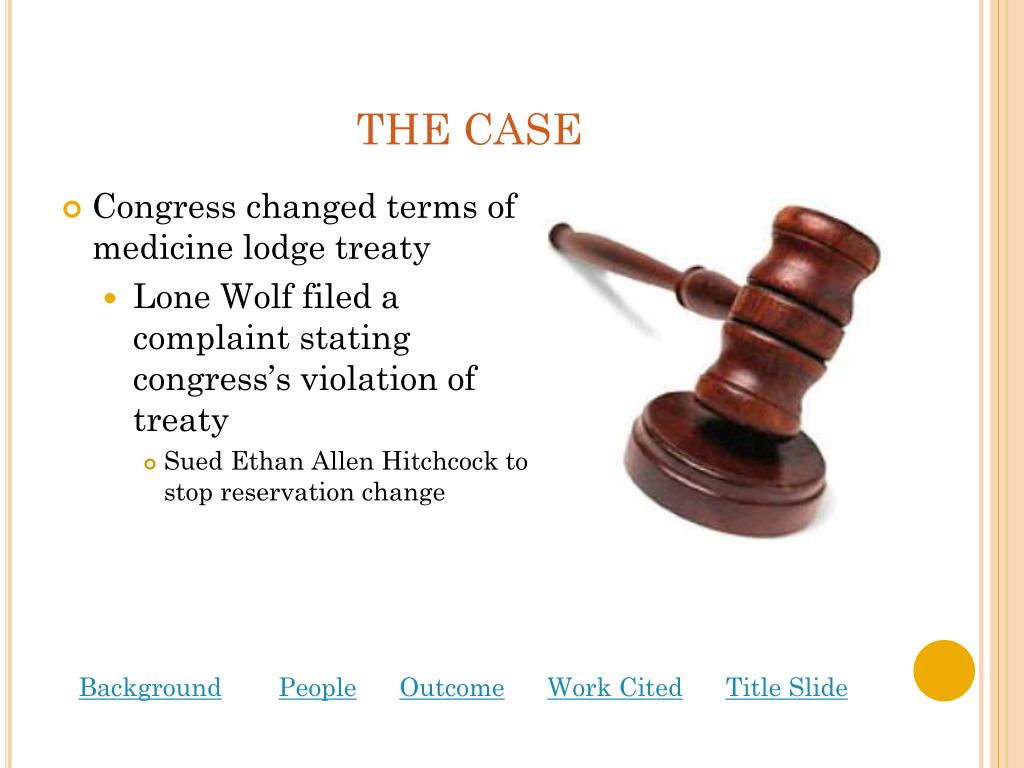
Lone Wolf has permitted the United States to appropriate tribal lands and resources under the guise of fulfilling federal trust responsibilities. This decision marked a decisive shift from the doctrines of the Cherokee Cases (1831–1832), which emphasized inherent tribal sovereignty and land rights. In Lone Wolf, the Supreme Court recognized a near-absolute plenary congressional power over Indian affairs, virtually exempt from judicial oversight. 1903 by vote of 9 to 0 White for the Court. Hitchcock set a dark precedent tribes had no legal recourse to defend their rights against Congress.187 U.S. Tribal concerns were deemed a political issue as opposed to a legal issue. The justices also held that the motives of Congress could not be examined in court. The justices determined that Congress had authority over tribes and that any rights or powers reserved for a tribe by agreements like the Medicine Lodge Treaty could be eliminated by Congress at any point in time. Hitchcock set a troubling precedent against the rights of Native Americans. The court ruled in favor of the United States in 1903. The case went before the United States Supreme Court.

Lone Wolf continued his lawsuit against Hitchcock. The federal courts ruled against Lone Wolf. He hired an attorney to contest the Jerome Agreement, and an injunction was filed against the Secretary of the Interior, Ethan Hitchcock. Congress approved a modified version of the Jerome Agreement in 1900, but Lone Wolf was still determined to fight it. As the Rock Island Railroad line was finished through the northern part of the reservation, small towns started to develop. These settlers robbed the reservation’s stone, timber, and minerals while establishing farms. During that time thousands of Euro-American settlers illegally rushed into Kiowa lands. It took eight years for Congress to ratify the Jerome Agreement. Eventually the Jerome Commission obtained enough signatures to approve allotment, although A’piatan, the opposition leader, accused the commission of fraud. The Medicine Lodge Treaty also stipulated that three-fourths of the men of the tribe needed to approve the sale of any tribal land. The commission proposed that the land be divided into 160-acre plots, but the Medicine Lodge Treaty of 1867 called for 320-acre plots if the land were ever to be divided.

The commission arrived at Fort Sill to negotiate allotment of the Kiowa and Comanche reservation in 1892.

The commission was known as the Jerome Commission after its chairman, David Jerome. Chief Lone Wolf, a nephew of Gui-pago, threatened to go to war if the act were forced on the tribe.Ĭongress formed a three-member commission in 1889 to negotiate allotments for 20 reservations in Oklahoma. The Kiowa were strongly opposed to the act. The idea behind the act was that allotment would force the tribal members to farm by limiting any ability to hunt, and the rest of the reservation could be opened to eager settlers. Once each tribal member was allotted a plot, the remaining land was sold and the profits went into a trust for the tribe that was managed by the federal government.

Reservation lands were divided into separate plots that were distributed to individual tribe members under the General Allotment Act of 1887.


 0 kommentar(er)
0 kommentar(er)
